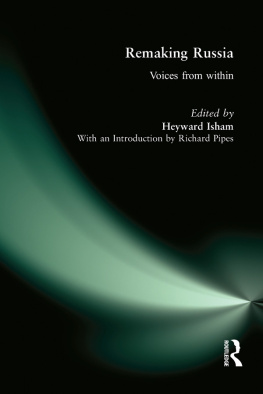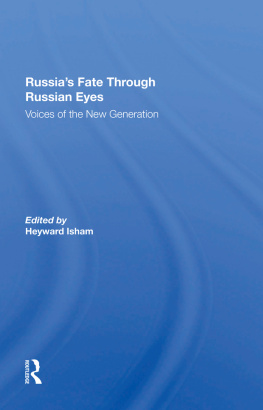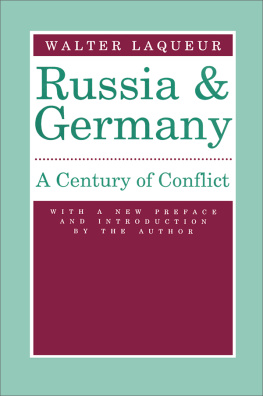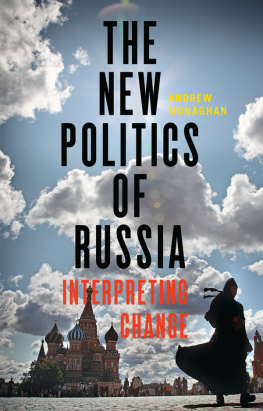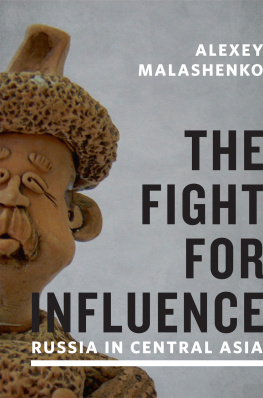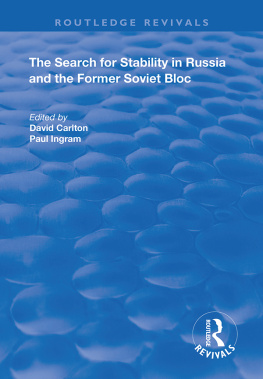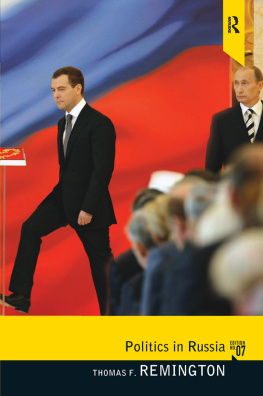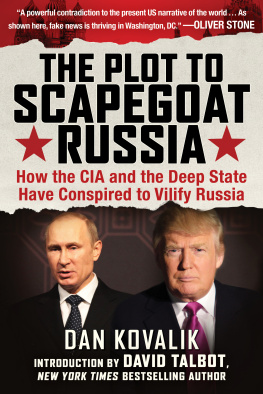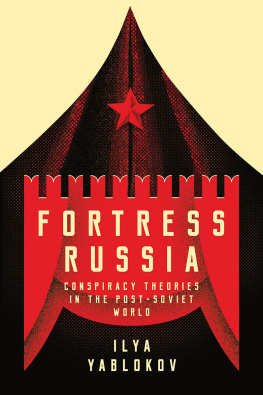REMAKING
RUSSIA
REMAKING
RUSSIA
_________________________________
Edited by
HEYWARD
ISHAM
First published 1995 by M.E. Sharpe
Published 2015 by Routledge
2 Park Square, Milton Park, Abingdon, Oxon OX14 4RN
711 Third Avenue, New York, NY 10017, USA
Routledge is an imprint of the Taylor & Francis Group, an informa business
Copyright 1995 Taylor & Francis. All rights reserved.
No part of this book may be reprinted or reproduced or utilised in any form or by any electronic, mechanical, or other means, now known or hereafter invented, including photocopying and recording, or in any information storage or retrieval system, without permission in writing from the publishers.
Notices
No responsibility is assumed by the publisher for any injury and/or damage to persons or property as a matter of products liability, negligence or otherwise, or from any use of operation of any methods, products, instructions or ideas contained in the material herein.
Practitioners and researchers must always rely on their own experience and knowledge in evaluating and using any information, methods, compounds, or experiments described herein. In using such information or methods they should be mindful of their own safety and the safety of others, including parties for whom they have a professional responsibility.
Product or corporate names may be trademarks or registered trademarks, and are used only for identification and explanation without intent to infringe.
Library of Congress Cataloging-in-Publication Data
Remaking Russia: voices from within / [edited by] Heyward Isham.
p. cm.
Translated from Russian.
Includes bibliographical references and index.
ISBN 1563244357.ISBN 1563244365 (pbk.)
1. Soviet UnionHistory.
2. Russia (Federation)History1991
3. National characteristics, Russian.
I. Isham, Heyward.
DK510.34.R46 1995
947dc20
9438420
CIP
ISBN 13: 9781563244360 (pbk)
ISBN 13: 9781563244353 (hbk)
To the memory of Ambassador Charles E. (Chip) Bohlen, who enjoyed peeling die layers from what he liked to call the Soviet Onion and whose indomitable leadership and wise counsel inspired and guided a generation of Foreign Service specialists on Russia
The Answer
But, I tell you, no past years have been spent in vain,
No unnecessary paths taken,
No things possessed without purpose,
No worlds unperceived,
No gifts left unacknowledged,
And no love given in vain.
And its never too late to start life all over again,
Start down the entire path,
So that no word or sigh from the past need be canceled out.
Olga Berggolts
1952, 1960
Institute for East West Studies
The Institute for EastWest Studies (IEWS), founded in 1981 as a transAtlantic partnership, serves as a catalyst to build sustainable democratic market societies in Central and Eastern Europe and to facilitate their achieving peaceful and productive interstate relations together with full integration into the community of open societies.
The primary goal of the IEWS is to develop and apply global knowledge to help make the societies of post-Communist Europe more productive, just, and responsible at the local, national, and international levels. To this end, the IEWS conducts programs of public policy research and analysis and serves as an action vehicle for achieving practical results in the transformation to civil societies. The IEWS emphasizes wider citizen participation in political and economic life, the enhancement of local community self-reliance and self-government, and the development of leadership in parliamentary bodies and grass-roots organizations.
The IEWS operates through a network of centers, including New York, Prague, Warsaw, and Budapest, and collaborates with individuals and institutions in order to link Central and Eastern Europe and the Newly Independent States with Western Europe and the United States.
Contents
Heyward Isham
Richard Pipes
Anatolii Pristavkin
Vyacheslav Ivanov
Fazil Iskander
Dmitrii Likhachev
Daniil Granin
Konstantin Azadovskii
Ales Adamovich
Leonid Batkin
Galina Starovoitova
Denis Dragunskii
Nikolai Shmelev
Emil Payin
Arkadii Vaksberg
Alexander M. Yakovlev
Protopresbyter Vitalii Borovoi
Iurii Afanasev
Andrei Voznesenskii
Sergei Filatov and Liudmila Vorontsova
Heyward Isham, born in New York City in 1926, graduated from Yale University in 1947 and pursued Russian language and area studies at Columbia University and later at the U.S. Army Language School at Regensburg, Germany (now the George C. Marshall Center at Garmisch). Entering the Foreign Service in 1950, he served as a political and economic officer at U.S. missions in Berlin, Moscow, Hong Kong, and Paris, where he was Deputy Chief of the U.S. Delegation to the Vietnam Peace Talks. He has also served as U.S. ambassador to Haiti, senior foreign service inspector, and faculty adviser at the National Defense University. Since retiring from the Foreign Service, Isham has worked as a consulting editor at Doubleday, where he acquired and edited a number of books dealing with contemporary Russia, and in his present position as vice-president of the Institute for EastWest Studies, where he has developed and implemented projects on postcommunist reconstruction for East Central Europe and Russia. He is the editor, with Maurice Friedberg, of Soviet Society Under Gorbachev: Current Trends and the Prospects for Reform (M.E. Sharpe, 1987).
Richard Pipes, born in Cieszyn, Poland, July 11, 1923, came to the United States in 1940 and was naturalized in 1943. Pipes received an A.B. from Cornell University in 1945 and a Ph.D. from Harvard University in 1950. Since 1950 he has been a member of the Harvard University faculty, where he is the Frank B. Baird Jr. Professor of History and Walter Channing Fellow in the Humanities. He has served as director of the Russian Research Center, Harvard University; as senior consultant at the Stanford Research Institute; and as director of East European and Soviet Affairs, National Security Council. Among his many books are The Formation of the Soviet Union (rev. ed., 1964), Russia Observed (1989), and The Russian Revolution (1990). His most recent work is Russia Under the Bolshevik Regime (1994).
Ales (Aleksandr Mikhailovich) Adamovich (19271994) fought as a teenager in a partisan detachment in Belarus, and his stirring wartime prose gained him renown in later years. An author, political commentator, screenwriter, member of the Belorussian Academy of Sciences, and professor of philology, Adamovich became a prominent critic of Stalinism and an advocate of political democracy who made his views known through television debates, novellas, articles, and speeches on the floor of the USSR Congress of Peoples Deputies, in which he served as a deputy (198991). His many writings included

